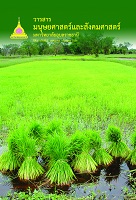แรงงานเวียดนามในสะหวันนะเขต สปป.ลาว
Main Article Content
บทคัดย่อ
แรงงานข้ามชาติในอนุภูมิภาคลุ่มแม่นํ้าโขง เป็นปรากฏการณ์ที่สะท้อนให้เห็นถึงความต้องการแรงงานในภาคอุตสาหกรรมและบริการ ที่ข้ามเส้นพรมแดนและในบางครั้งก้าวข้ามข้อกำหนดของรัฐ งานวิจัยนี้มีวัตถุประสงค์ในการศึกษาปัจจัยดึงดูดและปัจจัยผลักดันที่ทำให้แรงงานเวียดนามเข้าไปทำงานในสะหวันนะเขต การเข้าสู่กระบวนการทำงานในสะหวันนะเขตและการปรับตัวของแรงงาน โดยการสัมภาษณ์เชิงลึกแรงงานเวียดนามจำนวน 50 คน ผลการศึกษาพบว่า ปัจจัยผลักดันในเวียดนามที่ทำให้แรงงานเวียดนามเข้าไปทำงานในสะหวันนะเขต คือ ปัจจัยด้านเศรษฐกิจ ความหนาแน่นของประชากรในเวียดนาม และปัจจัยในด้านครอบครัว ส่วนปัจจัยดึงดูดใน สปป. ลาว คือ ปัจจัยด้านเศรษฐกิจ รวมทั้งความสัมพันธ์พิเศษระหว่างรัฐต่อรัฐของเวียดนามและลาวที่เอื้อให้แรงงานเวียดนามอยู่ในลาวได้อย่างมั่นใจในความปลอดภัย แรงงานเวียดนามอาศัยโครงข่ายทางสังคมของญาติพี่น้องและเพื่อนเข้าสู่การเป็นแรงงานข้ามชาติในลาวรวมทั้งช่วยในการปรับตัวในถิ่นปลายทาง
Vietnamese Migrant Workers in Savannakhet, Lao PDR
The Mekong Sub-region trans-national labor force is a phenomenon which reflects the demand for labor in the manufacturing and service industries. This demand exists beyond regulations of international and, at times, state borders. This research was based on in-depth interviews with 50 Vietnamese workers, and aimed to analyze the ‘push and pull’ factors contributing to Vietnamese workers’ arrivals in Savannakhet, their employment channels, social adaptation processes, and lifestyles. It was found that the key factors encouraging Vietnamese workers to travel to Savannakhet included the economy, population growth, and family issues. Laos offers an economic incentive to these workers, and a positive state-to-state relationship between Laos and Vietnam helps Vietnamese workers to live with a sense of security. A network of Vietnamese families and friends was found that recruited prospective workers as well as helped new workers to adjust their lives in the new country.
Article Details
บทความที่ได้รับการตีพิมพ์เป็นลิขสิทธิ์ของวารสารมนุษยศาสตร์และสังคมศาสตร์ มหาวิทยาลัยอุบลราชธานี
ข้อความที่ปรากฏในบทความแต่ละเรื่องในวารสารวิชาการเล่มนี้เป็นความคิดเห็นส่วนตัวของผู้เขียนแต่ละท่านไม่เกี่ยวข้องกับมหาวิทยาลัยอุบลราชธานี และคณาจารย์ท่านอื่นๆในมหาวิทยาลัยฯ แต่อย่างใด ความรับผิดชอบองค์ประกอบทั้งหมดของบทความแต่ละเรื่องเป็นของผู้เขียนแต่ละท่าน หากมีความผิดพลาดใดๆ ผู้เขียนแต่ละท่านจะรับผิดชอบบทความของตนเองแต่ผู้เดียว


